Articles by Karolina Kluczewska
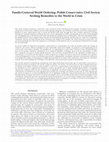
This article analyzes bottom-up, conservative, and reactionary world ordering from the margins. I... more This article analyzes bottom-up, conservative, and reactionary world ordering from the margins. It explores actors, visions, and practices of alternative, family-centered world ordering, taking the case of Polish conservative civil society organizations. Members of these organizations came to resent the liberal world order through their own everyday experiences of living through the capitalist transition in Poland after the end of communism in 1989. Consequently, they see the world plunged into overlapping crises of the liberal world order and neoliberal capitalism and seek alternatives. The article investigates where the family-centered visions originate from, how they develop from the ground up, and how they are enacted at community, municipal, national, and international levels. Pointing to the fluidity of the margins, the article shows how conservative civil society has gradually moved from the margins to a central place of the political scene in contemporary Poland and increasingly also internationally.

Critical methodologies in International Political Sociology (IPS) and its intersecting fields and... more Critical methodologies in International Political Sociology (IPS) and its intersecting fields and research traditions have increasingly coalesced around the idea that research should be done in dialogue, and possibly cooperation, with people rather than only about them. Drawing together research under this theme and wider debates on participatory, activist, and action research, alongside our own research experience, this article proposes the notion of cooperative research to capture and further develop this research agenda. In the context of neoliberal academia and its narrow insurance-based conception of research ethics and safety, we argue that cooperative and ethical research can be done and developed further both in the cracks and margins of the system, and in a gradual reform process within it. Starting with a survey of existing traditions and recent advances towards cooperative research, we proceed to unpack what cooperative research looks like in practice and how it benefits the involved parties. The article then explores structural and epistemic obstacles that cooperative research faces within the current institutional, body, and geo-politics of knowledge production. It also reflects on future avenues to productively deal with the inherent contradictions of cooperative research, not only by embracing the "ethos of critique", but also by trying to make (even small) changes within the Western knowledge production system by promoting, and rendering more legitimate, alternative forms of knowledge and storytelling.
In the past decade, large-scale urban reconstruction has been ongoing in Dushanbe, Tajikistan’s c... more In the past decade, large-scale urban reconstruction has been ongoing in Dushanbe, Tajikistan’s capital city. In this process, the city’s Soviet architecture is being demolished and replaced by Dubai-inspired high-rises. This transformation of public space is a manifestation of the process of silent de-Sovietization that has taken place in Tajikistan. Unlike what has been seen in other post-Soviet countries, this form of de-Sovietization does not result from rethinking the country’s Soviet past and deliberately departing from it. Rather, it is a casual by-product of Tajikistan’s capitalist transformation.
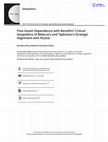
The 2022 invasion of Ukraine has stimulated a debate on Russia's relations with states which were... more The 2022 invasion of Ukraine has stimulated a debate on Russia's relations with states which were part of the Soviet Union. Our article contributes to this discussion by focusing on Russia's two 'strategic partners', Belarus and Tajikistan, and exploring these countries' perspectives. We develop a critical geopolitics framework which accounts for time, multi-level power dynamics and culture. The article provides a new understanding of the dynamics of geopolitical knowledge beyond the West, analysing how Belarusian and Tajik political elites' decision-making towards Russia has evolved from the late Soviet period until now. While both governments appear to be dependent on Russia and, consequently, generally supportive of its politics in the global arena, the article argues that this alignment has been highly strategic. Throughout the years, Belarusian and Tajik decision makers have skilfully navigated power and economic asymmetries with Russia by using their geographical location and Russia's neo-imperial mindset to their benefit.

This article explores post-Soviet power hierarchies which constitute a unique system of vertical ... more This article explores post-Soviet power hierarchies which constitute a unique system of vertical stratification in world politics. It does so by analysing relations between two former Soviet states, Tajikistan and Russia, in the aftermath of the Soviet Union's collapse in 1991. The article investigates the underlying reasons for power asymmetries between the two countries, the ways hierarchies are sustained and enforced, as well as perceived and navigated at political and social levels. It is argued that Tajikistan's relations with Russia are explicitly postcolonial without clear-cut colonial precedents in Soviet times. Postcolonialism did not automatically result from the Soviet breakdown. Rather, it has gradually emerged because of the two countries' very different paths of integration into the global capitalist economy, which subordinated Tajikistan to Russia. In this way, new economic asymmetries exacerbated Soviet-era legacies and reinvented them in a new, hierarchical manner. Overall, the article contributes to the debate on the nature of post-Soviet legacies and what it means to be post-Soviet.
This essay reflects on the satisfactions and challenges of early career researchers entering the ... more This essay reflects on the satisfactions and challenges of early career researchers entering the field of development work from an autoethnographic perspective. During my doctoral and postdoctoral research, I engaged in small-scale cooperations with local nongovernmental organisations in Tajikistan by assisting them with project development, implementation, and monitoring and evaluation. I saw pracademia as a more ethical and pragmatic way to engage with practitioners by supporting their work, while simultaneously pursuing my fieldwork. However, several obstacles arose in the process which reflected the unique ways in which international development and academia function. They concerned differences in organisational frameworks, epistemological and ontological approaches to social reality, as well as temporalities of these two fields.
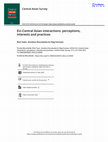
By shifting the study of European Union (EU)-Central Asian relations from its fixed category of b... more By shifting the study of European Union (EU)-Central Asian relations from its fixed category of black-boxing both the EU and Central Asia, this article advances the case for the approach of examining multi-level and multi-actor interactions that identify the dynamic processes of reciprocal action and meaning-making that characterize the mutual cooperation. It distinguishes perceptions, interests and practices, pointing to the rationales and modes of behaviour of multiple EU and Central Asian actors. The article also advances five reasons why EU studies should take more interest in Central Asia, given that the EU's larger external relations and security agenda extends to this region. Similarly, it shows that Central Asian studies can benefit from the analysis of the region's interactions with external actors, including the EU, given that external actors contribute to reshaping national policy agendas and influence everyday life.
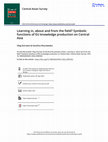
Examining the European Union's (EU) engagement with Central Asia since the early 1990s, we see an... more Examining the European Union's (EU) engagement with Central Asia since the early 1990s, we see an increased commitment to context sensitivity. Arguably, in order to design 'better' interventions, the EU needs to know more about this region. This article explores three means of EU learning: in the fieldthrough EU officials' first-hand experience of working at EU Delegations in Central Asia; about the fieldthrough programmed channels of external expert knowledge, and in particular think tanks; and from the fieldduring institutionalized consultations with multiple local actors, such as academics, journalists and nongovernmental organizations. It is argued that despite this complex learning infrastructure, EU knowledge production on Central Asia has a predominantly performative character. Rather than leading to changes in its relations with Central Asia, new knowledge produced by the EU aims at legitimizing this organization's pre-existing frameworks of engagement and practices of interactions with the region, and substantiating existing policy priorities.
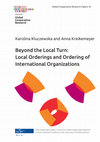
It has become common knowledge that international organizations (IOs) are struggling with local o... more It has become common knowledge that international organizations (IOs) are struggling with local ownership of their peacebuilding and development interventions worldwide. This happens despite the local turn which gained momentum in recent years in peacebuilding research and practice. Drawing on the post-liberal debate and area studies research focusing on conflict settlement, this paper argues that the continued difficulties of IOs to engage with the local needs to be seen in the context of multiple, diverse forms of ordering, namely structured and structuring processes of meaning-making and social interactions. To illustrate this argument, the paper refers to the case of Central Asia. Conceptualizing local orderings emerging from the ground up in communities which are targeted by internationally funded projects, on the one hand, and the underlying logic of ordering characterizing IOs and their interventions, on the other, allows us to see that there are structural differences between them. Following the Ethnographic Peace Research agenda, this paper compares these two ordering mechanisms by focusing on four specific components: cultural beliefs and norms, everyday practices, institutions, and issues of power.
This article analyzes why and how women's sex work is securitized in Tajikistan. It argues that s... more This article analyzes why and how women's sex work is securitized in Tajikistan. It argues that state actors view sex work as a threat to the nation in the context of two simultaneous processes: nation-building, centered around the family unit, and the fight against HIV/AIDS. The article explores the narratives, laws, and practices that are deployed to limit sex work. It also analyzes how security frameworks are experienced and navigated by women sex workers on a very local level. Three coping strategies are identified: hiding techniques, developing networks and befriending influential clients, and seeking companionship with other sex workers.
Building on previous work on the securitisation of HIV/AIDS, studies of framings, and the Copenha... more Building on previous work on the securitisation of HIV/AIDS, studies of framings, and the Copenhagen and Paris schools of security studies, this essay explores how policy framings of HIV/AIDS have shifted from the late Soviet period through to present-day Tajikistan. Pointing to both continuity and change, it shows how, under the influence of international actors and in accordance with nation-building priorities, Soviet-era medical and societal security framings gradually transformed into state security, demography and familyoriented framings. It also examines the resulting policy responses and practices that influence the everyday life of social groups who become identified as a public health concern.

This article scrutinizes and reconceptualizes covert research in social science. Surveying recent... more This article scrutinizes and reconceptualizes covert research in social science. Surveying recent literature about this research method, we reflect on the ethical and safety implications stemming from the widespread, even if well-intended, lack of transparency characterizing many research projects, especially ones conducted in difficult research contexts. While the standard definition of covert research holds that researchers deliberately do not declare to research subjects that academic research is taking place, we argue that the remoteness of Western academia from most researched contexts often a priori renders field research at least partially covert, irrespective of the researcher's intentions. This is because its aims, utility, and expected outputs are hard to understand for research participants unrelated to academia. We illustrate this argument by analyzing our own fieldwork experiences in Tajikistan and Kyrgyzstan. In conclusion, we emphasize the need to critically reflect on the de facto use of covert techniques by social researchers.

This article investigates internationally funded women's empowerment initiatives in Tajikistan. F... more This article investigates internationally funded women's empowerment initiatives in Tajikistan. Following the collapse of the Soviet Union in 1991 and the subsequent Tajik civil war (1992-1997), this newly independent, Muslim-majority country has experienced an influx of foreign aid, including in the field of women's rights. Drawing on extensive fieldwork, the article analyzes the growth and diversification of local, Western-funded women's non-governmental organizations (NGOs) between 1991 and 2020, paying attention to their leadership and aims, as well as changing perceptions of donors' interventions. It is argued that, initially, local activists were supportive of international projects, which promoted gender equality by supporting women's integration into the new, capitalist economy. In the last decade, however, an increasing conditionality of funding and deteriorating donor-NGO relations has fueled local contestations of the international agenda. The donor-enhanced women's empowerment model, which fosters individual responsibility and self-reliance, is increasingly criticized for aggravating the conditions of local women in the context of a growing economic insecurity characterizing the local capitalist economy. Against this resentment, an alternative women's empowerment model, advancing gender equity based on complementarity of male and female social roles and stressing the importance of family as a safety net against economic precarity, is gaining prominence locally.
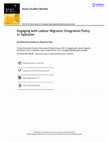
Tajikistan is one of the main migrant origin countries in the post-Soviet world, with about one m... more Tajikistan is one of the main migrant origin countries in the post-Soviet world, with about one million labour migrants living and working in Russia. It is also one of the world’s most remittancedependent economies. By exploring how and why the Tajik government has engaged with labour migrants since 1991, this article analyses the development of emigration policy in Tajikistan. In doing so, the article de-reifies the state and illustrates the complexity of policy processes: many actors are directly and indirectly involved in policymaking and implementation. Four aspects are analysed: shifts in emigration policymaking over time and the influence of different domestic actors; the assistance offered to labour migrants; the impact of Russia as the main host country; and the influence of international organisations in the context of the nascent global governance of migration. This article argues that Tajikistan’s emigration policy has gradually moved from a laissezfaire phase, through a proactive, then a “messy”, to a reactive one. It shows that Tajik authorities have followed often contradictory pathways of (non)involvement with labour migrants and thereby illustrates how declared policies can be distinguished from informal practices performed by the state.

This article examines the nexus between art and its ideological function, both discursively and i... more This article examines the nexus between art and its ideological function, both discursively and in practice, in the Soviet socialist republics. Scrutinizing the case of visual monumental art in Soviet Tajikistan in the 1970s and 1980s, it can be seen that the geographical and cultural distance from Moscow, in addition to complex multi-actor and multi-level policy implementation channels, allowed for non-conventional artistic practices to develop in the Soviet periphery. The article highlights the role of local officials and, in particular, artists in re-appropriating the official identity formation process with specific ideas of "nationhood," religion, and gender relations, while at the same time aspiring to comply with the dominant socialist realism doctrine. It is argued that, contrary to the prominent slogan "socialist in content, national in form," artworks produced in the Soviet periphery were often socialist in form and "national" in content. While the artists skillfully worked within the monumental art tradition promoted by the state, thus relying on a socialist form, not infrequently the meaning of their works distorted, or even contradicted, the official ideology. Often this subversion was non-deliberate. Ultimately, however, the artworks ended up strengthening an autonomous local agency that policy-makers in Moscow sought to eradicate.

This article analyses how global governance frameworks and knowledge claims are translated to fit... more This article analyses how global governance frameworks and knowledge claims are translated to fit local contexts. It specifically looks at harm reduction initiatives targeting injection drug users utilising the case of Tajikistan. In the 1990s, this post-Soviet Central Asian country became exposed to an inflow of cheap and easily available heroin from Afghanistan. While Tajikistan mainly became a transit country, some parts of the local population also became addicted. To tackle the negative consequences of heroin addiction, starting from the 1990s international donors proposed the country adopt a range of harm reduction measures, including providing access to opioid substitution therapy and establishing drop-in centres where single-use needles and syringes would be distributed. This article discusses how donor-promoted harm reduction initiatives were localised in Tajikistan, why and with what outcomes. It argues that instead of a full acceptance or rejection of knowledge promoted by international actors, a complex translation process can be observed on the ground. International norms are thus localised by taking into account societal attitudes towards injection drug users, the changing nature of legitimate expertise, evolving national legislation and everyday practices, against the background of other conflicting global governance regimes and local geopolitical priorities.
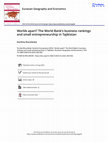
This article contrasts the World Bank’s policy-oriented, standardized assessment of the business ... more This article contrasts the World Bank’s policy-oriented, standardized assessment of the business climate and small business in Tajikistan with an alternative, bottom-up reading of local entrepreneurship focused on the life stories and business experiences of the young Tajik business community. It shows that the World Bank’s business evaluations and rankings, Doing Business and Enterprise Survey, offer a top-down understanding of business in this post-Soviet Central Asian country, which is filtered through an underlying neoliberal policy paradigm. This paradigm promotes economic liberalization, rivalry and individual responsibility for wellbeing at the expense of a welfare state, solidarity and common interest. The article proposes a different account which is centered on the socioeconomic, political and moral embeddedness of local business practices. Four aspects of doing business are analyzed: informality, the role of the state in regulating business, bribing, and the relevance of social networks. Such an alternative, ethnographically informed account is needed because this organization’s publications are seen by policymakers as an authoritative source of knowledge and, as a result, serve as a powerful global governance tool influencing economic reforms worldwide. These reforms, however, often exercise a negative effect on local economic lifeworlds.
By analysing constitutive everyday peace practices, the article shows that poor socio-economic co... more By analysing constitutive everyday peace practices, the article shows that poor socio-economic conditions, rather than political grievances and aspirations, are major sources of an actual and potential discontent in present day Tajikistan. It is argued that peace is atomised in a way that it is upheld through state withdrawal from welfare provision and an ongoing, ever more deepening fragmentation of the social fabric in the context of the precarity accompanying the country’s integration into the global political economy after the Soviet collapse and the subsequent civil war (1992–97). Nevertheless, individuals themselves navigate, domesticate and mitigate conflicts from the ground up.
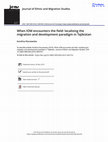
This article analyses localisation of the migration and development
paradigm, promoted worldwide ... more This article analyses localisation of the migration and development
paradigm, promoted worldwide by the International Organization
for Migration (IOM), by unpacking transformations that this
approach undergoes in aid-receiving countries assisted by this
organisation. Drawing on insights from International Relations and
the anthropology of development, and taking the case of a
specific policy transfer initiated by IOM in post-Soviet Tajikistan,
which involved setting up a local state-operated labour
recruitment system for industries abroad, the article advances
three arguments. First, the crucial relevance of actors in the field,
namely brokers who arrange and navigate IOM’s collaborations
with various actors on the ground, reveals that the authority of
IOM in Tajikistan is personalised and relational, rather than
institutional. Second, the existence of brokers points to an
ideological heterogeneity within IOM, which on the surface seems
united in its pursuit of the migration and development agenda.
Third, this article problematises the role of IOM in Tajikistan,
showing that the organisation interferes in state-citizens relations
and that its rhetoric of migration and development justifies a
market-tailored export of local labour, serving the global capitalist
economy. The article contributes to research on IOM, as well as
global-local interactions and international organisations in the field.
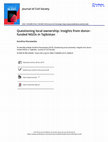
Local ownership is one of the popular paradigms of Western
development aid. It involves giving mo... more Local ownership is one of the popular paradigms of Western
development aid. It involves giving more effective control of the
design and implementation of development aid to local actors in
aid-receiving countries, including governments, non-governmental
organizations (NGOs) and local communities. This article contrasts
the understanding of local ownership as a top-down process
triggered by donors, with an alternative, bottom-up ownership,
which emerges spontaneously on the ground. By looking at the
case of a local NGO in post-Soviet Tajikistan, the article analyses
practices which reveal how the NGO actively takes ownership of
development aid through everyday work. This includes
fundraising, structuring relations with other organizations
competing for donor funding, selecting calls for proposals from
NGOs and writing grant applications. Each of these activities
involves negotiations of the goals and scope of development
work, against parameters imposed by donors. By means of
example, the article questions the application of the local
ownership paradigm in development work.
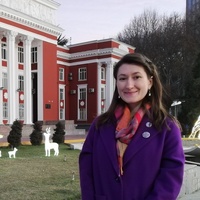
Uploads
Articles by Karolina Kluczewska
paradigm, promoted worldwide by the International Organization
for Migration (IOM), by unpacking transformations that this
approach undergoes in aid-receiving countries assisted by this
organisation. Drawing on insights from International Relations and
the anthropology of development, and taking the case of a
specific policy transfer initiated by IOM in post-Soviet Tajikistan,
which involved setting up a local state-operated labour
recruitment system for industries abroad, the article advances
three arguments. First, the crucial relevance of actors in the field,
namely brokers who arrange and navigate IOM’s collaborations
with various actors on the ground, reveals that the authority of
IOM in Tajikistan is personalised and relational, rather than
institutional. Second, the existence of brokers points to an
ideological heterogeneity within IOM, which on the surface seems
united in its pursuit of the migration and development agenda.
Third, this article problematises the role of IOM in Tajikistan,
showing that the organisation interferes in state-citizens relations
and that its rhetoric of migration and development justifies a
market-tailored export of local labour, serving the global capitalist
economy. The article contributes to research on IOM, as well as
global-local interactions and international organisations in the field.
development aid. It involves giving more effective control of the
design and implementation of development aid to local actors in
aid-receiving countries, including governments, non-governmental
organizations (NGOs) and local communities. This article contrasts
the understanding of local ownership as a top-down process
triggered by donors, with an alternative, bottom-up ownership,
which emerges spontaneously on the ground. By looking at the
case of a local NGO in post-Soviet Tajikistan, the article analyses
practices which reveal how the NGO actively takes ownership of
development aid through everyday work. This includes
fundraising, structuring relations with other organizations
competing for donor funding, selecting calls for proposals from
NGOs and writing grant applications. Each of these activities
involves negotiations of the goals and scope of development
work, against parameters imposed by donors. By means of
example, the article questions the application of the local
ownership paradigm in development work.
paradigm, promoted worldwide by the International Organization
for Migration (IOM), by unpacking transformations that this
approach undergoes in aid-receiving countries assisted by this
organisation. Drawing on insights from International Relations and
the anthropology of development, and taking the case of a
specific policy transfer initiated by IOM in post-Soviet Tajikistan,
which involved setting up a local state-operated labour
recruitment system for industries abroad, the article advances
three arguments. First, the crucial relevance of actors in the field,
namely brokers who arrange and navigate IOM’s collaborations
with various actors on the ground, reveals that the authority of
IOM in Tajikistan is personalised and relational, rather than
institutional. Second, the existence of brokers points to an
ideological heterogeneity within IOM, which on the surface seems
united in its pursuit of the migration and development agenda.
Third, this article problematises the role of IOM in Tajikistan,
showing that the organisation interferes in state-citizens relations
and that its rhetoric of migration and development justifies a
market-tailored export of local labour, serving the global capitalist
economy. The article contributes to research on IOM, as well as
global-local interactions and international organisations in the field.
development aid. It involves giving more effective control of the
design and implementation of development aid to local actors in
aid-receiving countries, including governments, non-governmental
organizations (NGOs) and local communities. This article contrasts
the understanding of local ownership as a top-down process
triggered by donors, with an alternative, bottom-up ownership,
which emerges spontaneously on the ground. By looking at the
case of a local NGO in post-Soviet Tajikistan, the article analyses
practices which reveal how the NGO actively takes ownership of
development aid through everyday work. This includes
fundraising, structuring relations with other organizations
competing for donor funding, selecting calls for proposals from
NGOs and writing grant applications. Each of these activities
involves negotiations of the goals and scope of development
work, against parameters imposed by donors. By means of
example, the article questions the application of the local
ownership paradigm in development work.
describing the country through the prism of problems and social vulnerabilities, they offer a nuanced analysis of local political and societal changes occurring in the recent years, in regional and global contexts.
openDemocracy spoke to five small-scale, grassroots feminist initiatives in Italy, Poland, Azerbaijan, Kazakhstan and Tajikistan – countries in which the authors have expertise and local contacts – which transcend mainstream narratives about women’s rights. From transfeminist alliances to disability rights and sexual and bodily autonomy, these groups aim to tackle complex forms of injustice.
The difference between the silence of ‘official’ Dushanbe and the views found on Tajikistan’s streets could not be starker
I was doing field research in Tajikistan when Russia attacked Ukraine. In a country where people usually are not concerned about world affairs, the war suddenly became a frequent topic of discussion, and a major preoccupation of many people whose livelihoods depend on Russia. This post-Soviet Central Asian country is tied to Russia in many ways: historically, politically and, most importantly, economically. Based on my observations, I sketch in this paper how the first weeks of the war in Ukraine affected Tajikistan.
Post-communist states, both the pre-existing ones and those which emerged after the Soviet disintegration, followed very different paths of handling the artistic remains of their immediate past. Dealing with symbols is highly symbolic.
with Anna Kreikemeyer
Bei der Lösung von Konflikten werden die Gemeinschaften vor Ort oft viel zu wenig einbezogen.
The story of two Lenin statues in Dushanbe is emblematic of the country’s complex process of coming to terms with its history.
The 9/11 Legacies project
The events of 9/11 and the subsequent Global War on Terror have profoundly transformed the landscape of international development in post-Soviet Central Asia.
https://www.gcr21.org/publications/gcr/gcr-quarterly-magazine/global-cooperation-research-2-/-2021
International development is a highly normative and emotional enterprise. This is particularly the case on the very local level, in spaces where divergent visions of local order are negotiated – in villages, Komsomol venues and NGO offices. Zooming-in to these spaces offers IR researchers a new, bottom-up lens to think about international development interventions through the eyes of participants of these processes.
colorful Soviet legacy? For Firuza, Timur, Yusuf, Nargis, and Nodira, the mosaics are art that they can reinterpret and connect to the present in light of their own experiences.
undoubtedly, most of the aforementioned issues require a close attention. However, long-term stability of the region cannot be pursued without addressing some less visible, yet critical problems. These are often issues of domestic nature that set the very environment within which a stable and prosperous development can be imagined. While national governments are primarily responsible for addressing (or not addressing) these challenges, international partners of the region have a big role to play. This brief looks at three particular areas – education, economy and equality – that are critical for sustainable development of the region and deserve more national and international attention.